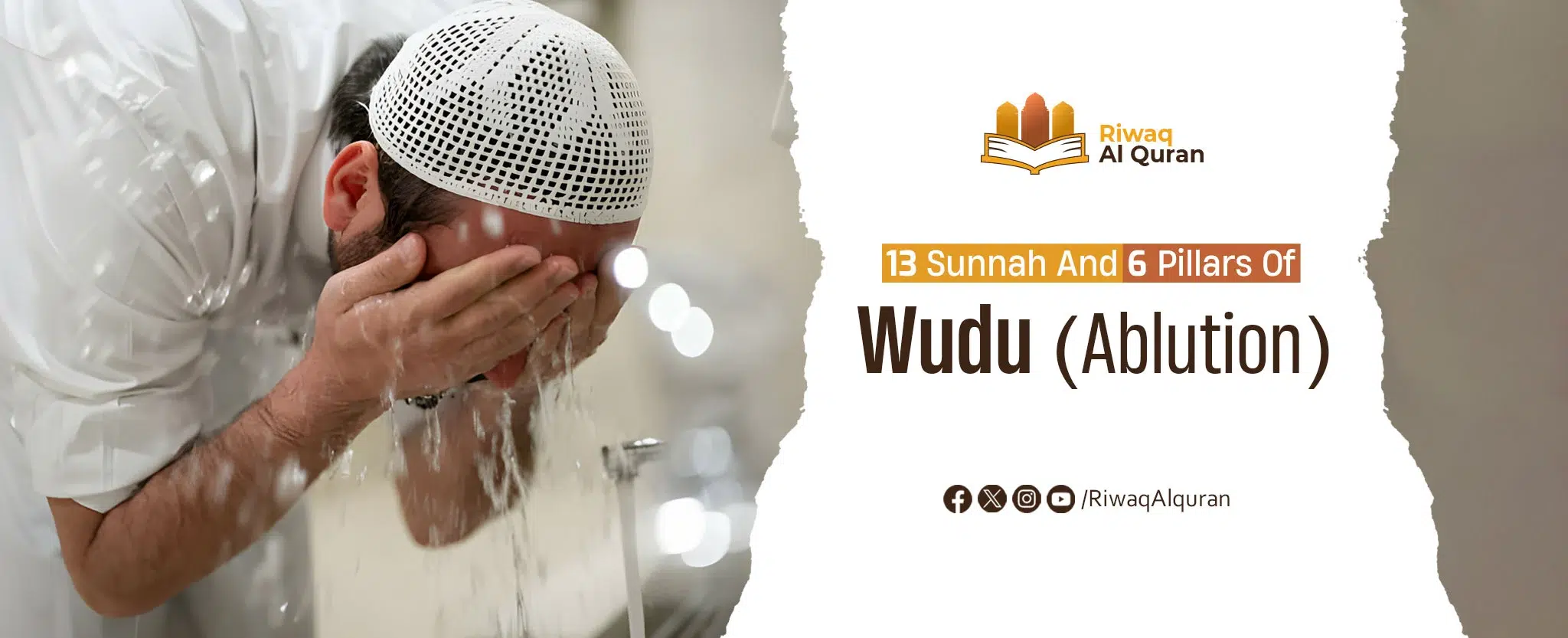The Sunnah and pillars of wudu define the essential and recommended aspects of this purification ritual. The pillars, including intention, washing the face, hands, and feet, wiping over the head, and maintaining the correct order, are obligatory for wudu to be valid. Omitting any of these nullifies the ablution.
On the other hand, the Sunnah acts, such as saying “Bismillah,” rinsing the mouth, wiping the ears, and using minimal water, enhance the spiritual and hygienic benefits of wudu but do not affect its validity if left out.
What are the Sunnah And Pillars of Wudu? The steps of wudu are easy to know, but Mistakes happen and that’s why it’s important to know when it happen, does it affect the pillar of Wudu, or is it not a pillar?
If your Wudu becomes Invalid then you also have to repeat the Salah you did with it if you remember it. So, it’s important to know what parts of Wudu are necessary Pillars and what aren’t. To know if you dropped one, you may know if your Wudu is valid or not.
Table of Contents
Sunnah of Wudu Meaning:
The Sunnah of wudu refers to the recommended practices and actions established by the Prophet Muhammad (peace be upon him) that enhance the ritual of purification before prayer but leaving them does not invalidate the Wudu. While these Sunnah practices do not invalidate wudu if omitted, they significantly increase its rewards and contribute to a deeper connection to worship.
These actions, such as saying “Bismillah,” washing specific body parts in a particular order, and maintaining cleanliness, emphasize mindfulness, spirituality, and adherence to Islamic traditions.
17 Sunnah of Wudu
The Sunnah of wudu enhance the spiritual significance and reward of this purification ritual, reflecting the teachings of the Prophet Muhammad (peace be upon him). Key practices include saying “Bismillah,” washing hands and palms, rinsing the mouth, and wiping the ears, among others, emphasizing cleanliness and mindfulness in preparation for prayer.
Engaging in these Sunnah practices fosters a deeper connection to worship and adheres to the traditions of the Prophet.
1. Saying Bismillah Before Wudu
Beginning wudu with the phrase “Bismillah” (In the name of Allah) is an important Sunnah that signifies the intention to purify oneself. It reflects mindfulness and spiritual focus, establishing the act of wudu as an act of worship. The Prophet Muhammad (peace be upon him) emphasized this practice, stating that saying Bismillah before performing any act of worship enhances its spiritual significance and cleanliness.
2. Washing the Hands Up to the Wrists Before Using Water
Washing the hands up to the wrists before starting wudu serves to cleanse them of any impurities and signifies the intention to begin the purification process. This act is based on the practice of the Prophet Muhammad (peace be upon him) and emphasizes cleanliness and hygiene, ensuring that the hands are clean before coming into contact with the water used for wudu.
3. Washing the Palms to Clean Them
Washing the palms is a specific Sunnah that ensures the hands are clean before engaging in the wudu process. This step helps remove any unseen impurities and prepares the hands for the subsequent acts of purification. It reflects a holistic approach to cleanliness, which is a key aspect of Islamic practice.
4. Rinsing the Mouth and Inhaling Water (Start with Both)
Rinsing the mouth and inhaling water through the nose (known as madhmadhah and istinshaq, respectively) are essential parts of wudu. These actions not only purify the mouth and nasal passages but also symbolize spiritual cleansing. It is recommended to do them with fresh water for each attempt, following the example of the Prophet Muhammad (peace be upon him), who practiced them regularly.
5. Wiping Over the Ears (After Wiping the Head)
Wiping over the ears is an important Sunnah that follows the act of wiping the head during wudu. The Prophet Muhammad (peace be upon him) stated that the ears are considered part of the head, and thus they should also be included in the purification process. This act serves as a reminder of the importance of cleanliness in all aspects of worship, enhancing the spiritual state of the individual.
6. Washing the Face, Arms, and Feet One, Two, or Three Times (The Head Only Once)
In wudu, washing the face, arms, and feet one, two, or three times is based on the Sunnah of the Prophet Muhammad (peace be upon him). While the head is washed only once, the flexibility in the number of washes for other body parts emphasizes thoroughness in purification. The ideal practice reflects both adherence to tradition and personal choice, promoting cleanliness and attention to detail.
7. Saying the Dua After Wudu
Reciting a specific Dua (supplication) after completing wudu is a Sunnah that enhances the spiritual significance of the purification process. This Dua serves as a means of seeking Allah’s blessings and forgiveness, reinforcing the intention behind the act of wudu. It symbolizes the transition from physical purification to spiritual readiness for prayer.
8. Don’t Use Too Much Water (Sunnah Is to Use a Bucket if Possible)
The Sunnah encourages moderation in the use of water during wudu, highlighting the importance of conservation and respect for resources. Using a bucket for wudu is preferable, as it allows for better control over water usage. This practice reflects the Islamic value of sustainability and mindfulness in daily rituals.
9. Performing Wudu Before Every Salah (Even If Your Wudu Is Still Valid)
It is recommended to perform wudu before each Salah (prayer), even if the previous wudu is still valid. This practice emphasizes the importance of spiritual cleanliness and preparation for prayer. By renewing wudu, worshippers can enhance their focus and devotion during Salah, aligning with the Prophet Muhammad’s (peace be upon him) teachings.
10. Using Siwak Before Wudu
Using Siwak (a natural tooth-stick) before wudu is a Sunnah that promotes oral hygiene and freshness. The Prophet Muhammad (peace be upon him) regularly used Siwak, emphasizing its benefits for both physical cleanliness and spiritual purification. Incorporating this practice into the wudu routine enhances the overall experience of purification.
11. Starting with the Right Hand, Then Left, and Also Right Leg, Then Left
In wudu, it is Sunnah to start washing the right hand and foot before the left. This practice reflects the Islamic preference for the right side in acts of cleanliness and worship, symbolizing goodness and blessings. Following this order not only adheres to the Sunnah but also instills a sense of mindfulness in the purification process.
12. Passing Your Fingers Through Your Beard
Passing fingers through the beard while performing wudu is a Sunnah of the Prophet Muhammad (peace be upon him). This action signifies thoroughness in purification and cleanliness, ensuring that the beard is included in the washing process. It emphasizes the importance of attention to detail in personal hygiene as part of one’s worship routine.
13. Washing Beyond the Elbows or Heels
When performing wudu, it is important to wash beyond the elbows and heels to ensure complete cleanliness. This practice emphasizes thoroughness in purification, reflecting the Sunnah of the Prophet Muhammad (peace be upon him). Washing beyond these areas ensures that no part of the body is neglected, adhering to the principles of hygiene and readiness for prayer.
14. Making the Intention (Niyyah) Before Starting Wudu
Before beginning wudu, making the intention (niyyah) is essential as it aligns the heart and mind with the act of purification. This internal commitment signifies the purpose behind wudu—seeking closeness to Allah and preparing for prayer. Intention is a foundational aspect of many acts of worship in Islam, highlighting the importance of conscious awareness in spiritual practices.
15. Ensuring Orderliness in the Sequence of Actions
Maintaining orderliness in the sequence of wudu actions is a Sunnah that reflects the Prophet Muhammad’s (peace be upon him) method. Following the prescribed order—washing the hands, face, arms, head, and feet—reinforces the structured nature of the ritual. This organized approach promotes focus and discipline, enhancing the overall experience of purification.
16. Moistening the Entire Head in One Wipe, Including the Ears
Wiping the entire head in one motion, including the ears, is a Sunnah of wudu that signifies thoroughness and efficiency in purification. This practice, based on the teachings of the Prophet Muhammad (peace be upon him), ensures that all parts of the head are cleansed appropriately, emphasizing the importance of cleanliness in preparation for prayer.
17. Avoiding Reliance on Others for Help in Wudu, Unless Necessary
While assistance may be acceptable in cases of need, performing wudu independently is encouraged to foster self-reliance and personal responsibility in worship. The Prophet Muhammad (peace be upon him) exemplified this practice, emphasizing the importance of individual accountability in acts of worship. This approach allows for a more personal and meaningful connection with the purification process.
Read more about: What Breaks Wudu? Full Guide
Experience Riwaq Al Quran Classes
Watch real moments from our live sessions at Riwaq Al Quran and see how we bring learning to life. These clips highlight our interactive, student-focused approach designed to keep learners engaged, motivated, and actively involved in every step of their educational journey.
Pillars of Wudu
The “Pillars of Wudu” are essential components that must be fulfilled for wudu (ablution) to be valid; without any of the pillars, wudu doesn’t count. There are Six pillars of Wudu:
- Intention (Silent)
- Face Washing
- Washing hands to elbows
- Wiping over the head
- Washing feet to ankles
- Order of steps as mentioned
1- Intention
Intention is a general pillar in any act of worship for the famous authentic hadith: “Deeds are by intentions” Sahih Bukhari and Muslim
Intention in Wudu means to intent it as an act of worship to Allah almighty. Also intention is to intend to do (Wudu) and not just wash your face and hands etc.
Also, a valid intention to have while doing wudu is to seek the forgiveness of Allah. As The prophet peace be upon him said that: sins come out from the body with wudu Sahih Bukhari and Muslim
Note that Intentions are in the heart, so it’s silent and should not be said out loud. This teaches Muslims to always be aware of their hearts and present.
2- Face Washing
The first act of Wudu as mentioned in the Ayah of Wudu is to wash the face.
The face is vertically from the hairline (Without considering baldness) to the end of the chin, and horizontally from the ear to the ear. These are the boards of the face that scholars have agreed on and as defined in the Arabic language.
Washing the face is to make sure that water reaches all parts of it. The best way is to gather water in the palm and splash it while wiping over it.
3- Washing Hands to elbows
After the face, wash the Hands in the Ayah of Wudu.
The hands are from the fingers to the elbows, including both.
Washing can start from the elbows down or from the fingers up to the elbows, as long as water runs over the area.
An easy way to do it is to take water in the palm of your hand, then raise your hand slowly, and water will run down to the elbow.
make sure to Rub the water and to reach all the hands.
4-wiping over the head
The third step mentioned in the Ayah of Wudu is wiping over the head.
Note that wiping is different than washing. Wiping the head means to just pass your wet hand over your head, without it having water.
Scholars agree that wiping over the whole head is better in Wudu, but disagree on if it’s mandatory or not.
Maliki and Hanbali say it’s mandatory to wipe over the whole head. While Shaf’I and Hanafi say it’s valid to just wipe over a part of it.
It isn’t narrated in any hadith that the prophet peace be upon him wiped over just a part of the head. And when the prophet peace be upon him wiped over his forehead, he would continue wiping over his head cover. Sahih Muslim
5-washing feet to ankles
The last part in wudu is the feet, and it’s mandatory to wash it.
the Ayah of Wudu is clear on the feet and it should be washed not wiped. It’s mentioned without repeating the order of washing, but in Arabic grammar, it’s coupled with the face and the hands instead of the head. This is clear on making the washing mandatory.
Also, washing is clear in the Sunnah and all four Madhab agree it’s mandatory.
The prophet peace be upon him saw a man who didn’t wash his heel and said “Save your heels from hell-fire” Sahih Muslim
So make sure that water reaches all the foot including heels and ankles and wash it with hand.
6-Order as mentioned
This Order is the order from the Quran and Hadith. So many scholars say that to do wudu in that order is an obligation for its validity.
Note that this isn’t held as an obligation by only Shaf’i and Hanbali Madhab. Maliki and Hanafi Madhab see it as not an obligation, but a Sunnah.
The ordered Wudu is a Wudu that doesn’t get you mixed in that disagreement, and it’s the form mentioned in the Quran and Sunnah.
Read more about Wudu with Socks: Masah or Wiping over Socks and Khuf
Why Students Love Learning with Riwaq Al Quran
Hear directly from our students about how Riwaq Al Quran Academy has transformed their connection with the Book of Allah. Their experiences reflect the dedication, care, and quality that guide every step of our teaching.
Learn Quran, Arabic And Islamic Studies Online With The Best Native Tutors
Riwaq Al Quran is a comprehensive online platform that offers personalized Quran, Arabic and Islamic Studies Online classes for individuals of all ages and backgrounds.
Their experienced instructors use a structured curriculum to cover Tajweed, Tafsir, and Memorization, providing easy and effective access to learning the Quran.
The advanced online classes allow for seamless communication and interaction between students and teachers. Join Riwaq Al Quran for a deeper connection with the Quran.
We offer several courses such as:
- Online courses for kids.
- Online Quran classes for kids and adults.
- Online Arabic courses
- Online Ijazah courses
- Online Islamic Studies courses.


Conclusion
Wudu has Pillars that it becomes invalid without and makes any salah with it also invalid. And Also, Wudu has sunnah that completes it and beautifies it and makes it’s rewards plenty.
While making Wudu, it should be a reminder to you that you are seeking to be clean and pure in both body and spirit. And also, that this purity is a statue which you need to stand before your creator.
Sunnah doesn’t mean (don’t do it), Rather Sunnah means (Do it). it’s a great deed and honor to be following the steps of the prophet peace be upon him.
The purpose of knowing it is just in case you made a mistake or forgot at some point, then you know if your wudu is valid or not.
And Remember, the prophet peace be upon him said: “If anyone performs the ablution well, his sins will come out from his body, until they come out from under his nails.” Sahih Bukhari and Muslim


































